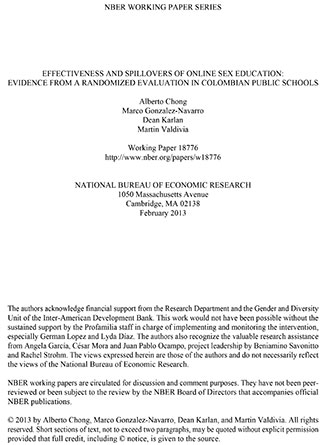Effectiveness and Spillovers of online sex education: evidence from a randomized evaluation in Colombian public schools
| Year | : | 2013 |
|---|---|---|
| Author/s | : | Alberto Chong, Marco Gonzalez-Navarro, Dean Karlan, Martin Valdivia |
| Area/s | : | Health and nutrition |
[2013] CHONG, Alberto; GONZALEZ-NAVARRO, Marco; KARLAN, Dean y Martín VALDIVIA. Effectiveness and Spillovers of online sex education: evidence from a randomized evaluation in Colombian public schools. NBER, Working Paper No. 18776.
Artículos de divulgación basados en el presente documento de trabajo:
– Is Internet-Based Sexual Education Effective? de Angela García Vargas y Rachel Strohm (Development that Works. Efectiveness Blog, IADB)
– Development that Works: Is Internet-Based Sexual Education Effective? de Angela García Vargas y Rachel Strohm (Eval Central)
Sexual health problems cause negative externalities from contagious diseases and public expenditure burdens from teenage pregnancies. In a randomized evaluation, we find that an online sexual-health education course in Colombia leads to significant impacts on knowledge and attitudes and, for those already sexually active, fewer STIs. To go beyond self-reported measures, we provide condom vouchers six months after the course, and find a 9 percentage point increase in redemption. We find no evidence of spillovers to untreated classrooms, but we do observe a social reinforcement effect: the impact intensifies when a larger fraction of a student’s friends is also treated.






